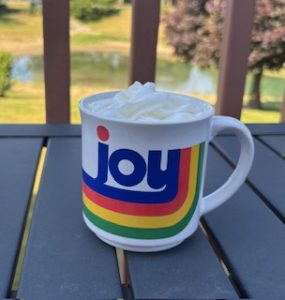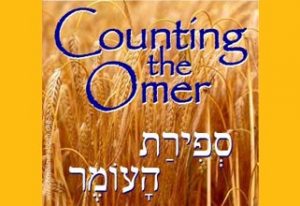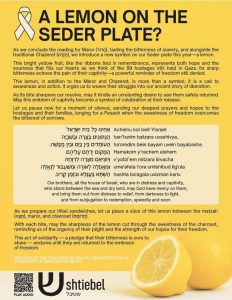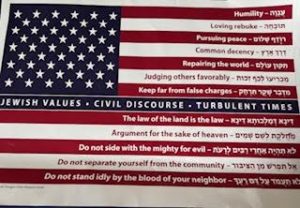 Let me begin by thanking the Elgin Police Department and Lieutenant Miriam Duffy for bringing the EPD Pride Squad car this morning. It wasn’t always the case that the police were helpful to the gay community. In fact, the reason Pride Month is Jue is because of Stonewall uprising, which began in June 28, 1969. Here in Elgin at least, with its focus on community policing, there is a different model. And it applies to us as the Jewish community and other marginalized groups. So we thank EPD.
Let me begin by thanking the Elgin Police Department and Lieutenant Miriam Duffy for bringing the EPD Pride Squad car this morning. It wasn’t always the case that the police were helpful to the gay community. In fact, the reason Pride Month is Jue is because of Stonewall uprising, which began in June 28, 1969. Here in Elgin at least, with its focus on community policing, there is a different model. And it applies to us as the Jewish community and other marginalized groups. So we thank EPD.
Now my real beginning:
My colleague, Rabbi Heidi Hoover started her Pride Shabbat Siddur with these words:
Every person is welcome to do Judaism here:
All genders
All races
All marital statuses
All ethnicities
All religions
All abilities
All ages
All knowledge levels
All everyone!
That is true here as well. It mirrors our embracing diversity plank in our vision statement.
Today we pause to mark Pride Month as Pride Shabbat. Tomorrow many will march in Chicago or participate in the festivities. Earlier this month, Elgin hosted its own Pride parade and festival.
This year at CKI while people seem pleased, there has been less excitement, and I received no direct push back. People are weary. I know that.
So why does this matter at all?
Even before I came almost 14 years ago, we were an open and affirming congregation. We had the marriage equality logo on our website and in truth that was part of my reason for coming. I fear we may need to add it back on the website. We’ve spent other Pride Shabbats examining Rabbi David Greenstein’s grammatical discussion on Leviticus 18 which we will reprise shortly. We’ve looked at ways to be more gender inclusive including how to call people up to the Torah. So, this is not new at CKI.
Let me be clear, we have LGBTQIA+ people at CKI. Some are visible and some choose not to be. That is their right. We see you and support you. We have couples who have been married a long time. Couples with children. Newlyweds. People who came out later in life. People who are exploring their gender fluidity. Parents of children who are gay. We welcome all of you. All means all.
Yet, when I announced this year’s Pride Shabbat at the board meeting, people were surprised that Israel is pro-LGBTQIA+ In fact, it is the only pro-LGBTQ country in the Middle East. However, this year, Tel Aviv had to cancel its legendary parade. It was supposed to be the day after Israel bombed Iran and there were no gatherings, no synagogues open, no work, no school and so no public gatherings including the Pride Parade.
Recently, Pride Parades in this country have not always been safe spaces for Jewish groups. In Chicago, especially Chicago.
In 2017, the Chicago Dyke March ejected Jewish marchers carrying rainbow flags with Stars of David. For the organizers those flags seemed too close to the Israeli flag and might be triggering to Palestinian marchers. This incident sparked controversy and accusations of antisemitism, with some Jewish community members expressing safety concerns about future participation. The march organizers later stated that the women were asked to leave for expressing Zionist views, while others criticized the march for excluding individuals based on their Jewish identity.
Sadly, this tension over intersectionality continues to be an issue. Just yesterday a Detroit news outlet, WXYZ ABC Detroit: explained that with rising antisemitism and anti-Israel fervor, was spilling over into Pride. https://www.wxyz.com/us-news/lgbtq/october-7th-attacks-continue-to-fray-lgbtq-jewish-communities-20-months-on
Why, then, does this Pride matter to the Jewish community? I feel like I have given this sermon more than once but perhaps it needs to be said over and over again.
For me, it is simple. We, as a Jewish community need to be allies. We need to support those Jews who consider themselves LGBTQIA+. We need safe, non-judgmental spaces, for all. In this congregation it fits with our vision statement that includes “Embracing Diversity”
For me, it is simple. When I went back to look at what I have said in the past on this topic, it is all there in black and white—or maybe rainbow colors.
For me, it is simple. This is a question of freedom of religion.
Over and over again, I have clergy of different stripes try to argue scripture with me. In some denominations welcoming gay members or ordaining gay clergy almost split denominations in factions. I relish those debates. It is helpful if they have a good grounding in Hebrew grammar. Often, they bring up a troubling verse in Leviticus, just ahead of the holiness code, the most central portion of Torah that tells us to “Love our neighbors as ourselves. V’ahavta l’rayecha kamoch.” which is our study theme for the whole year. Sometimes people argue, what does rayecha means. I repeatedly tell you that every translation is a commentary, a midrash if you will. Rayecha could mean neighbor, kin, tribe. It could be only Jews or everyone.
For our purposes, let’s assume it means everyone—all our neighbors, Jew or gentile.
In Chapter 18 there is that troubling verse that is the reason that many believe that homosexuality is wrong. Not only wrong but a sin an abomination.
The King James translation says: “Thou shalt not lie with mankind, as with womankind: it is abomination.” (Lev 18:22) It is part of a long list of sexual sins, and it is the traditional reading for Yom Kippur. Many congregations, including our own, read the Holiness Code instead, because of this verse. It is included in our machzor, high holy day prayerbook, published by the Conservative Movement’s Rabbinical Assembly with a copyright of 1972. 1972. This is not a new conversation. And this was early in the fight for gay rights. Remember, Stonewall was only 1969.
But what if the King James translation is wrong? It has set 500 years of public policy. With thanks to Rabbi David Greenstein who was the Rosh Yeshivah at the Academy for Jewish Religion, and who taught this verse as part of a class on marital relations and later published them Let’s look at them carefully. I am no Hebrew grammarian at his level so we will use his exact words which follow this d’var Torah. He believes by looking deeply at the grammar of the verse, it really is a polemic against gang rape. See, your high school English teacher was right; it pays to know grammar!
It is really an elegant graceful, grammatical argument and the authors of the King James translation missed it. So for over 500 years there has been needless pain and suffering for LGBTQ folk.
I have quoted his argument before. But it needs repeating. Again. This very week. It is at the end of this D’var Torah.
When I first studied this with Rabbi Greenstein all I could say was WOW! It was “mind blowing.” Yasher koach to Rabbi Greenstein. I wonder how much pain and suffering of those in the LGBTQ community could have avoided if King James had better translators. Yet, in that long drive between AJR and Boston, as I called friends in my excitement, Rev. Dr. David Ferner, an Episcopal priest wondered what the big deal was. Episcopalians have been teaching that for a long time.
It should be simple. Yesterday morning, I finally got to see a rainbow in this Pride month. Many saw some Thursday night in Elgin but if you were up early Friday, there was a beautiful one in the middle of a rainstorm we desperately need. What is so special about a rainbow? The rainbow is a symbol of the covenant that G-d made after the Flood. It is a blessing to see a rainbow…and of course there is a blessing to recite. Baruch atah adonai, zocher habrit. Blessed are You, G-d, who remembers the covenant. We too need to remember that covenant and not destroy the world.
The story of Noah is before there were Israelites, Hebrews, Jews. The covenant is between G-d and everyone. That includes anyone identifying as LGBTQIA+. There are two Jewish organizations that use the name Keshet, rainbow. One is here in Chicagoland and works with those with intellectual disabilities. The other, founded in Boston but now working nationally is a great resource for the Jewish LGBTQIA+ community. https://www.keshetonline.org/ I have supported them for years, and refer people to them routinely.
This should be simple.
Last night we dedicated the new AED. It is so important to have one. I talked about an important verse from the Talmud, (Sanhedrin 37a): “Whoever saves a single life is considered by scripture to have saved the whole world.’ Because we are created in God’s image, b’tzelem elohim. All of us are created b’tzelem elohim. All. Which fits again with the vision statement that embraces diversity.
That’s why it is important that we do this. To create that safe, non-judgmental space. To possibly save a life. The rate of suicide amongst the LGBTQIA+ community is higher than the average numbers:
- Elevated Suicide Risk: LGBTQ+ youth are over four times more likely to attempt suicide than their peers.
- Transgender & Nonbinary Youth: This group faces even higher rates of suicide consideration and attempts. For instance, in one survey, 46% of transgender and nonbinary young people seriously considered suicide, compared to 30% of cisgender young people. Transgender youth also have significantly higher odds of attempting suicide compared to cisgender LGBQ peers.
https://www.thetrevorproject.org/survey-2024/
That was then. This is now. NOW! Just yesterday, the Supreme Court ruled on a case that would limit LGBTQIA+ rights but maybe expand parents’ rights to limit student’s exposure to learning about LGBTQIA+ people or seeing themselves in books. I have not had any time to read the decision yet, and I am not an attorney, but I do know that we have several books published by PJ Library for our youngest students that are both LGBTQIA+ friendly and Jewish. I have no intention of removing them. Kids need to see their family structures represented in all of our literature.
And while that hasn’t been time to study it, I actually see it as a slam against freedom of religion, not just freedom of speech. They have also released a ruling on gender-affirming care that I fear will drive that suicide rate up even higher.
This is not the first time courts have ruled against LGBTQ+ rights and it has the very real possibility that it could also impact our rights as Jews . In 2019, South Carolina wanted to deny the rights of LGBTQIA+ people and Jews to be foster parents.
“The federal government agreed Wednesday to allow federally funded foster care agencies in South Carolina to deny services to same-sex or non-Christian couples.
The waiver issued by the U.S. Department of Health and Human Services will allow Greenville’s Miracle Hill Ministries to continue as a state-supported foster care agency.” https://www.nbcnews.com/feature/nbc-out/s-c-group-can-reject-gays-jews-foster-parents-trump-n962306
They have also released a ruling on gender-affirming care that I fear will drive that suicide rate up even higher.
This is the end of Pride Month. We have a smorgasbord of wonderful treats for you to enjoy..We thank the EPD for bringing their Pride decorated squad car. But pride is more than rainbows and unicorns. We cannot afford to take our eyes off this all too important topic. It is a matter of freedom of religion—our freedom of religion. I am proud to stand as a Pride ally this morning. This month be proud. Be clear that you are created in the image of G-d. And that you are loved by that G-d with an infinite love. Period. All means all.
May the door of this synagogue be wide enough
to receive all who hunger for love, all who are lonely for friendship.
May it welcome all who have cares to unburden,
thanks to express, hopes to nurture.
May the door of this institution be narrow enough to
shut out pettiness and pride, envy and enmity.
May its threshold be no stumbling block
to young or straying feet.
May it be too high to admit complacency, selfishness and harshness.
May this be, for all who enter, the doorway to a richer and more meaningful life.
From Mishkan T’Filah
Rabbi David Greenstein’s words:
“Leviticus 18:22 and 20:13 have been read for millennia as the Torah’s condemnation of homosexuality. How should we read these verses as we enter the sacred sphere with “zot,” with our conviction that we carry the Divine Presence with us – straight or queer– as we are? I submit that we may read these verses in a new way, a way that removes them entirely from the topic of homosexuality. The verse in Leviticus (18:22) is comprised of three elements – persons (V’et Zachar), forbidden acts (lo tishkav mishkevei ishah), and a term of condemnation (to’evah hi). Let us examine each element in reverse order…
When we consider the first part of the verse, the part that mentions the persons involved in the forbidden act, we read the phrase “And with a man” / “V’et zachar.” Now, the particle et may indicate the object of an action.
Until now our verse in Leviticus has been read to mean that a male is prohibited to make another man the object of his sex act. But this word can have another meaning. The first place where it is unambiguous that the word et is being used in another way is in the verse, “And Enoch walked with (et) the Almighty…” (Genesis 5:24).
In that verse it is clear that the particle does not signify an object indication. Rather, it means “along with.” Now we may read the verse very differently:
v’et zachar And along with another male lo tishkav you shall not lie
mishkevei ishah in sexual intercourses with a woman to’evah hi it is an abomination.
There is no prohibition of homosexual acts of any kind. Rather, the Torah prohibits two males from joining together to force intercourse upon a woman. This is a to’evah because the introduction of the second man completely transforms the act from a potentially innocent act into a manipulation that degrades the act of intercourse and makes the woman subject to violence and objectification.”
http://www.on1foot.org/sites/default/files/Interpreting%20Leviticus%20-%203%20part%20lesson_0.pdf
Additional Readings and Kavanot
Permission to shine:
You have permission
to laugh until you can’t speak.
And to speak until you can’t catch your breath.
You have permission to fall in love with yourself.
Or to not know which self you really are today.
You have permission to be curious, confused, clueless and aimless.
Yes, you have permission.
The rainbow spirit inside of you has been lighting up the world ever since the day you were born.
And you, in all your radiance?
Are worth being seen, however you want to be.
בָּרוּךְ אַתָּה אֲדֹנָי אֱלֹהֵינוּ מֶלֶךְ הָעוֹלָם שֶׁעָשָׂנִי בְּצֶלֶם אֱלֹהִים
Baruch atah Adonai, Eloheinu, Melech haolam, she-asani b’tzelem Elohim.
Blessed are you G-d, our G-d, king of the universe, that created me in the image of the Divine.
Devon Spier
Before Ma’ariv Aravim:
Twilight People -–Rabbi Reuben Zellman
As the sun sinks and the colors of the day turn, we offer a blessing for the twilight,
for twilight is neither day nor night, but in-between.
We are all twilight people. We can never be fully labeled or defined.
We are many identities and loves, many genders and none.
We are in between roles, at the intersection of histories, or between place and place. We are
crisscrossed paths of memory and destination, streaks of light swirled together. We are neither day nor night. We are both, neither, and all.
May the sacred in-between of this evening suspend our certainties, soften our judgments, and widen our vision.
May this in-between light illuminate our way to the God who transcends all categories and definitions. May the in-between people who have come to pray be lifted up into this twilight.
We cannot always define; we can always say a blessing. Blessed are You, God of all, who brings on the twilight.
(We didn’t use this one this year because we were a morning service)
Before Mi Chamocha:
Our people came out of Egypt a mixed multitude, the spray of dividing waters sparkling diamonds all around them. We stood together at Sinai, all of us—future, present, past—amid the rumble of thunder and the crack of bright lightning, to enter into covenant with the One who loves us, in whose shining image we are all created, over and over again. We have wandered bleak landscapes, built flimsy tents of skins and then houses of stone. We have planted orchards and vineyards, seen two Temples rise and then go down in surging flames, forcing us into exile. We have loved and lost, grieved and danced, transgressed and celebrated. Hidden, suffered, thrived. And we gather here this day, in the community of our people, a mixed multitude, and we sing out: Hear O Israel, we stand together, all of us, descendants of the single first human created on the sixth day, and of our myriad parents down through the generations, too numerous to name. We stand together, link arms, and pray. Blessed are You, God of the universe, who sanctifies us with the commandment to love ourselves and one another—in all our varied ways—and blesses us with a diamond-bright radiance that still ripples out from Your first spoken words of creation.
Andrew Ramer
For Aleinu:
Love Wins
One day, the words ‘coming out’ will sound strange,
Oppression based on gender or orientation will be a memory,
History to honor and remember,
The pain of hiding, repressing, denying,
Honoring the triumphs of those who fought to be free,
Remembering the violence and vitriol that cost lives.
When love wins,
When love wins at long last,
ואהבת לרעך כמוך,
Love your neighbor as yourself’
Will be as natural as breathing.
ואהבת לרעך כמוך!
One day, love will win every heart,
Love will win every soul,
Fear will vanish like smoke,
And tenderness for all will fill our hearts.
ואהבת לרעך כמוך!
Love wins. In the end,
Love wins.
Man for man,
Woman for woman,
Woman for man,
Man for women,
All genders,
All orientations,
All true expressions of heart.
ואהבת לרעך כמוך!
Let this come speedily,
in our day,
A tribute to the many
And the diverse
Gifts from heaven.
A tribute to love deep and true,
Each of us for one another.
ואהבת לרעך כמוך!
© 2016 Alden Solovy
Reading before Kaddish:
As we continue to the Mourners’ Kaddish, we include all those who have been
murdered because they were LGBTQIA+, including: Shira Banki, 16, who was murdered during the Jerusalem Pride march in 2015; the 49 people who were murdered in the Pulse nightclub shooting in Orlando in 2016; Harvey Milk, first openly gay elected official in California, who was assassinated in 1978; Matthew Shepard, who was beaten and left to die in Laramie, Wyoming in 1998; and Paris Cameron, 20, a Black transgender woman, was among three people killed in a horrific anti-LGBTQ shooting in a home in Detroit on May 25, 2019. Alunte Davis, 21, and Timothy Blancher, 20, two gay men, were found dead at the scene and Cameron was taken to the hospital, where she died from her injuries. We include all of those who have died of AIDS, particularly in the 1980s and 1990s. We include those who have committed suicide because their gender identity was unacceptable to others. We include also those in countries outside the United States who have been executed for being LGBTQIA+
From Rabbi Heidi Hoover’s Pride Shabbat Siddur.





